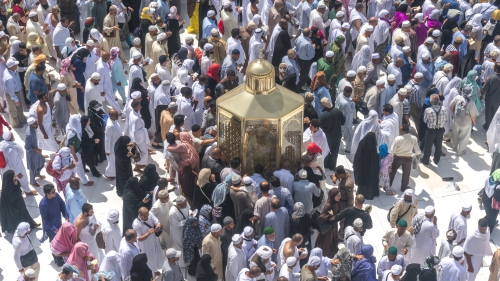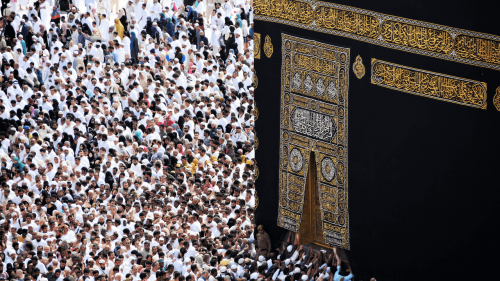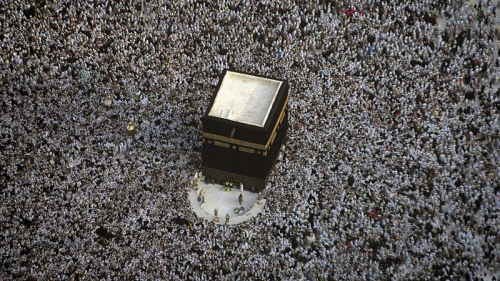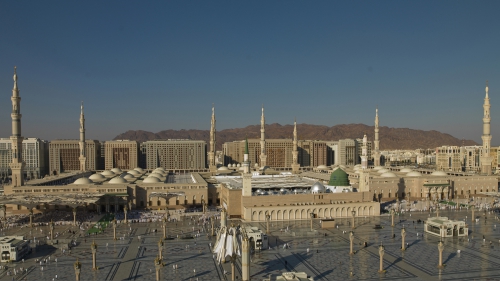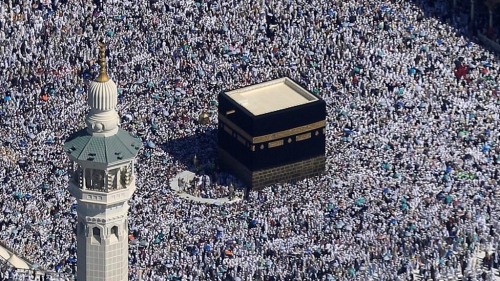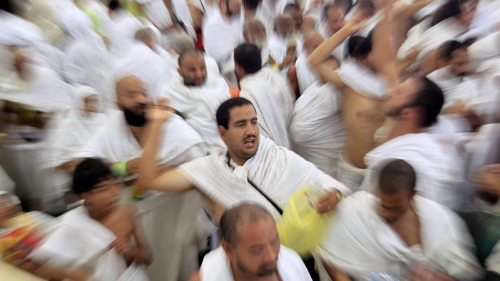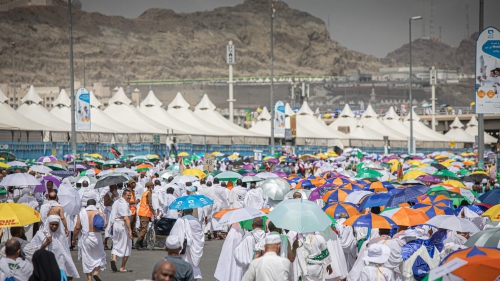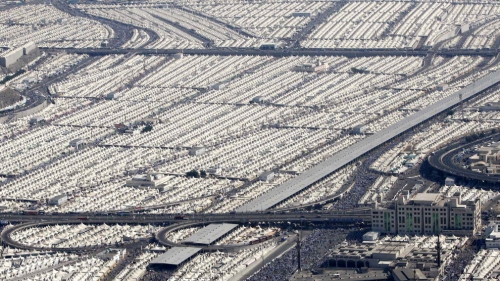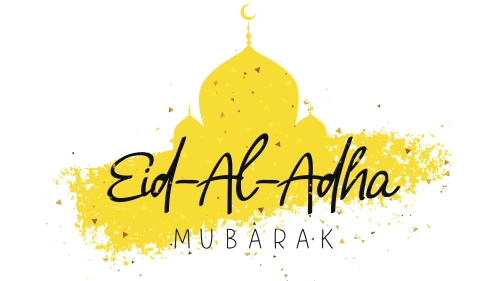Pilgrim's Progress

It is a Muslim's sacred duty to live for a few days as a pilgrim, a reasonable requirement for a lifetime. The Pilgrimage or the Hajj is a composite of rites that are essentially reenactments of events of the distant past and, at one point, a grand dress rehearsal for what is to come. Adam, Abraham, Hagar, Ishmael, and Muhammad are the human names most closely associated with this rite, and what's asked of the pilgrim is simply to emulate these luminaries, for the reason that their deeds, however ordinary they may appear, were connected to a higher realm.
The response to this call remains a marvel, especially in an era in which there is enormous pressure to be devotees of the material world and to succumb to the spiritual sloth this engenders. Despite this, each year millions of people drop everything in order to make the Pilgrimage, which has difficulty and expenses. It's a ritual that remarkably still matters. One of life's principal struggles is to pierce the outer form of things and to imbibe the interior meanings. But the struggle is magnified when living in a context in which unexamined information is constantly available and when personal quiet and retreat are becoming odd things to pursue. What follows are brief personal reflections and vignettes loosely connected by the Hajj thread, especially as they pertain to the interior.
VACATION
To call the Hajj experience a "vacation" would put off a lot Muslims, who would consider the label a slight. But what I wanted out of Hajj was precisely a vacation, but in the original sense of vacating my mind of the assumptions we absorb as passive consumers of modernity, and vacating the ephemeral identities we attach importance to. One of the graces of the Pilgrimage to Makkah and its surroundings pertains to a kind of anonymity that strips us down to our indelible identity as creatures of a great Creator. For a number of days, millions of people of all races and status converge for a single purpose. The Pilgrim, by choice, is one face among millions of faces of all hues and textures. In the crowd, I can bump into a CEO, a leader, an academic, or a beggar; there's no way to really tell the difference. Rank and pomp are divorced of status. Ego is dispossessed of platform. In this condition, the Hajj does its work.
THE "ART OF WAITING"
The movements of the Hajj rites are not very time consuming. Surprisingly, what takes up most of the time are the long stretches within and between the rites that can be easily mistaken as times to "wait". It's possible to miss the point of the Pilgrimage if we are not adept in the "art of waiting," as a sage once said. In fact, what a Pilgrim does during the "wait" will largely inform the success of the journey. Pilgrims do what this place silently expects of them: supplicate to the unseen God, remember Him in the holy precincts. And so they ask for a good life, another chance, forgiveness and mercy for themselves and those they left behind (for the living and the dead), knowledge, success, succor, or for unaffected glimpses of Reality-sifting out the real from the fake. The movements of the Pilgrims are not as choreographed as one would think, even though everyone pretty much goes to the same stations and performs similar acts. What goes on in the mind and in the heart -the inner motions -range. The dress, the motion, the crowds, the "meanwhile," and the heightened sense of purpose and of the imminence of our ultimate return draw out from the Pilgrim levels of resolve. We wish it can last. The rites are capped off with farewell circuits around the Ka'ba back in Makkah, where it began days before. The Pilgrims then get around to board the buses, and slowly the former identities begin to emerge as we prepare our papers and "ID's" to board a plane. It's the daunting challenge of the Pilgrim to give honest reflection to the questions provoked by the ritual, especially when he or she is back home driving a car, mowing the lawn, waving at a neighbor, or simply reading a newspaper.
THE EFFECTS OF REENACTMENTS
We make seven circular walks around the tall cube-shaped Ka'ba, the first man-made building put into the service of reminding people of their servitude to God. Later we walk seven times between two hillocks, the course that Abraham's wife, Hagar, took in her desperate search for water, only to be guided to the very spot of the great well of Zamzam, which to this day offers drink to thirsty travelers from all corners of the earth. The walk between the two hillock is an essential rite of the Hajj. But as we walk Hagar's path, we ourselves are not desperate, nor are we out of water. If we tire, we can stop for rest, sip some water, and then resume without the peril that Hagar faced. It's not like revealed religion to waste people's time. There must be important value in reenacting Hagar's walk, however symbolic it may be. We may fairly conclude that the materials and strict rationality of the dunya (the world) are poor ushers in the sacred climb. Instead, we are advised that the invisible realm of sincerity, intention, and symbolism are required accoutrements for the piercing of the materialistic veil. So we make circuits around the Ancient House, walk a path between two hills, and, in Mina (a few kilometers away), toss seven pebbles at three pillars that mark the spots where Satan tried to tempt Abraham away from God's obedience. These are rites of worship filled with symbolism meant to quicken our spiritual selves.
MT. MERCY
The heart of the Hajj, its proving ground and day, is at Mt. Arafat. On its plains, slopes, and peak, millions of people (can't help but repeat that number) gather from dawn to sunset for supplication and remembrance. The scene is almost supernatural. The importance of the Hereafter is stressed nearly on every page of the Quran and countless statements of the Prophet. Firm belief in the Hereafter is expected of us in the here and now. Yet nothing in our normal everyday lives compares to the spectacle of all of humanity standing before God for ultimate judgment. The Arafat experience offers something for our imaginations, a glimpse of the inevitable. It helps us to map additional meaning to the words we read in the Quran -helps us to tease out greater sense from the descriptions the Book reveals. There is a glow and ease associated with Arafat, which abruptly alters at sunset when the throngs of humanity board buses, SUV's, and sandals and head for Muzdalifa, an extensive plain that looks like a large parking lot of gravel and stones. There we wait until dawn before we head to Mina, Tent City, where the population (comparable to Chicago) will cram together in an area the size of a large mall. As citizens of Mina for a few days, we are shown the full range of human character and fallibilities. Each day of our stay at Mina we take small stones and toss them at large pillars that represent Satan's guile -small stones doing mighty work.
IN MADINA
People of all races, headdress, and determination converge in Madina to visit the Arabian Prophet, which is not a formal part of the Hajj. These folks are driven to Madina by their love of the Prophet, which they imbibed through the curious method of education. But you sense nothing rote in their visit nor in their emotions. And since when can an emotion be passed down and kept strong enough to drive people to make the journey to the Prophet's tomb? Love cannot be taught, as they say. And this is true. But when one learns more of the life of the Messenger, love seems to be the crest of the education, where all facts and roads naturally lead. This is the Prophet's grace. Yes, Makkah is a majestic city. If you knew nothing and merely opened up your heart and stood on its hallowed ground, you'd sense that this is a sacred center, alive in more than one realm. It is kingly. You feel you're in the presence of the August, the Wise. Madina, though, is a light. It is friendly. You come with your flaws and feel welcomed nonetheless. Your humanity is accepted. Just come with a willingness to climb. Greet the host of the house, convey your regards and prayers of peace, and he will respond. Walk up to him, and he will know. Sit anywhere and reflect or read or thumb your beads or raise your hand in sure supplication or simply relax -it's all accepted. It's all good. The guests do not feel self-conscious. You are what you are.
CONCLUDING REMARKS
We each have a body, a fact we're constantly reminded of, and a body does have needs, organic and sensual, which we cater to day and night. But to submit to the curriculum of fundamentalist secularists that "body" defines humanity is a dereliction that revealed religion has always warned of. We are created from the clay of the earth but are also infused with a soul that has no material correlate in this world. Religion has recognized this duality, not as a glitch in our creation, but as a trial. Somewhere in the teachings of all the great ones (including Abraham, Moses, Jesus, and Muhammad), there's an un-asterisked point: in negotiating the material and spiritual selves, one brushes up against salvation. The choice, they have stressed, comes down to the question: what aspect of our humanity do we devote ourselves to? For the Muslim, the nurturing of the soul is paramount and is guided by what we offhandedly call in pamphlets the "five pillars of Islam," essential rites of worship that have been passed down through the sound line of prophecy. These pillars start to lose their meaning when we forget a baseline understanding of religion: Islam insists that each of us is born into this world with a pure condition, a state of grace, in fact. While humans may be feeble, sometimes foolish, belligerent, and forgetful, our center was made uncorrupt. This is equally true for men and women. The rites of worship and the way of life they engender are meant to bring us closer to our original state because it is not confused about God nor indifferent to our role in His world.
Ibrahim N. Abusharif is a Chicago-area editor and writer. He's currently working on a concise vocabulary reference to the Quran. He may be reached at [email protected]. You may visit his blog: http://fromclay.blogspot.com/
Related Suggestions
We should remind each other that this is the best days to do amaalas Salihan which Allah likes most the first ten days of Zul Hijjah.So we must take advantage to do more amaal for those of us who are unable to make it for this year's Hajj.We should keep Fast on Tuesday the Arafah Day which brings two years of Kaffarah atonement sana madiyah wa bakiyah.Allah accept our Hujjaj and they become the means of guidance to the entire mankind.








